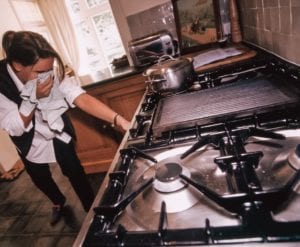How to Detect A Gas Leak: Simple Warning Signs
Protect Your Family By Teaching Them These Simple Warning Signs Of A Gas Leak
Do you have a natural gas furnace, stove or any gas appliances in your home? If you do, it’s important to know how to detect a gas leak because you do not want a gas explosion in your home.

In February 2019, a natural gas leak inside a home in Ontario, Canada caused a massive explosion that rocked an entire neighborhood. The blast completely leveled the house, leaving only a huge, flat pile of rubble. Twenty surrounding houses were damaged by the sheer force of the explosion and flying debris, with the nearest four houses sustaining heavy structural damage that needed to be repaired before residents could return home. Tragically, one person was fatally wounded, and it’s fortunate that many more were not.
Fortunately, house explosions are not common. And if you know how to detect a gas leak, you can use your senses to detect a leak. Use your nose, eyes and ears.
Use your nose
Natural gas is naturally odorless, but your gas utility adds an odor to it so that you will know right away if there’s a problem. A sulphuric, rotten egg smell is the surest sign that you have a gas leak, maybe a small leak around your stove, water heater or furnace.
Use your ears
If gas is leaking from a pipe, appliance, or behind a wall, you may hear hissing or a whistling noise. Sometimes you can hear this hissing sound from a loose connection. The louder the whistling noise the more substantial the leak.
Use your eyes
You can spot damaged or loose connections. If it doesn’t look right, call your gas utility.
If you have a gas stove, the flame should burn blue. If the flame is more orange or yellow, the burner is not getting enough oxygen and it is not completely combusting the natural gas. It’s okay if the flame is initially yellowish-orange as long as it turns blue. Turn off burners if the flame is not burning blue.
Houseplants with wilting or yellowing leaves, especially near a gas fireplace or appliance, could be a sign of a leak as natural gas will prevent plants from taking in carbon dioxide. Dead patches of grass in your yard could indicate an underground natural gas leak.
What to do if you suspect a natural gas leak
Do your nose, ears or eyes lead you to believe you have a natural gas leak? Take it seriously and follow these steps immediately:
- Remain calm and act quickly—you’ll need to leave your home and go outside
- Shut off the main gas valve if you know how
- Open windows as you leave
- Once you’re a safe distance from your house, call your gas utility immediately
Remember the Signs & Stay Safe
If you suspect a natural gas leak, always call your gas utility first. After the emergency is dealt with and the gas has been shut off, you can contact a home services company about repairing the leak.

